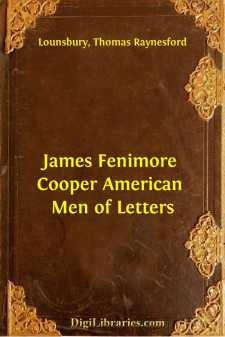Categories
- Antiques & Collectibles 13
- Architecture 36
- Art 48
- Bibles 22
- Biography & Autobiography 813
- Body, Mind & Spirit 142
- Business & Economics 28
- Children's Books 14
- Children's Fiction 11
- Computers 4
- Cooking 94
- Crafts & Hobbies 4
- Drama 346
- Education 46
- Family & Relationships 57
- Fiction 11829
- Games 19
- Gardening 17
- Health & Fitness 34
- History 1377
- House & Home 1
- Humor 147
- Juvenile Fiction 1873
- Juvenile Nonfiction 202
- Language Arts & Disciplines 88
- Law 16
- Literary Collections 686
- Literary Criticism 179
- Mathematics 13
- Medical 41
- Music 40
- Nature 179
- Non-Classifiable 1768
- Performing Arts 7
- Periodicals 1453
- Philosophy 64
- Photography 2
- Poetry 896
- Political Science 203
- Psychology 42
- Reference 154
- Religion 513
- Science 126
- Self-Help 84
- Social Science 81
- Sports & Recreation 34
- Study Aids 3
- Technology & Engineering 59
- Transportation 23
- Travel 463
- True Crime 29
James Fenimore Cooper American Men of Letters
Categories:
Description:
Excerpt
Chapter I.
1789-1820.
In one of the interior counties of New York, less than one hundred and fifty miles in a direct line from the commercial capital of the Union, lies the village of Cooperstown. The place is not and probably never will be an important one; but in its situation and surroundings nature has given it much that wealth cannot furnish or art create. It stands on the southeastern shore of Otsego Lake, just at the point where the Susquehanna pours out from it on its long journey to the Chesapeake. The river runs here in a rapid current through a narrow valley, shut in by parallel ranges of lofty hills. The lake, not more than nine miles in length, is twelve hundred feet above tide-water. Low and wooded points of land and sweeping bays give to its shores the attraction of continuous diversity. About it, on every side, stand hills, which slope gradually or rise sharply to heights varying from two to five hundred feet. Lake, forest, and stream unite to form a scene of quiet but picturesque beauty, that hardly needs the additional charm of romantic association which has been imparted to it.
Though it was here that the days of Cooper's childhood were passed, it was not here that he was born. When that event took place the village had hardly even an existence on paper. Cooper's father, a resident of Burlington, New Jersey, had come, shortly after the close of the Revolutionary War, into the possession of vast tracts of land, embracing many thousands of acres, along the head-waters of the Susquehanna. In 1786 he began the settlement of the spot, and in 1788 laid out the plot of the village which bears his name, and built for himself a dwelling-house. On the 10th of November, 1790, his whole family--consisting, with the servants, of fifteen persons--reached the place. The future novelist was then a little less than thirteen months old, for he had been born at Burlington on the 15th of September of the year before. His father had determined to make the new settlement his permanent home. He accordingly began in 1796, and in 1799 completed, the erection of a mansion which bore the name of Otsego Hall. It was then and remained for a long time afterward the largest private residence in that portion of the State. When in 1834 it came into the hands of the son, it still continued to be the principal dwelling in the flourishing village that had grown up about it.
On his father's side Cooper was of Quaker descent. The original emigrant ancestor had come over in 1679, and had made extensive purchases of land in the province of New Jersey. In that colony or in Pennsylvania his descendants for a long time remained. Cooper himself was the first one, of the direct line certainly, that ever even revisited the mother-country. These facts are of slight importance in themselves. In the general disbelief, however, which fifty years ago prevailed in Great Britain, that anything good could come out of this western Nazareth. Cooper was immediately furnished with an English nativity as soon as he had won reputation....


